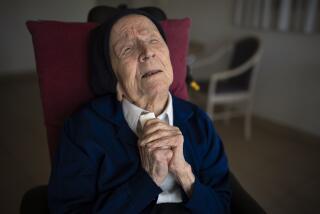G. de Gaulle-Anthonioz, 81; Nazi Fighter
- Share via
PARIS — Genevieve de Gaulle-Anthonioz, a niece of the late French President Charles de Gaulle who joined the French Resistance and was later deported to a Nazi concentration camp, has died. She was 81.
De Gaulle-Anthonioz died Thursday in Paris after an undisclosed illness, according to officials at ATD Quart Monde, a French humanitarian organization that she once led.
President Jacques Chirac on Friday paid homage to the modest woman with a famous name who joined the French underground in 1940 at age 19 after the Nazi occupation of Paris.
“By the strength of her commitment, her unfailing determination and her limitless courage, she symbolized the spirit of the resistance,” Chirac said.
Her work for the underground ended in 1943, when she was arrested and, after six months in a French prison, deported to Ravensbruck, a concentration camp in Germany for female political prisoners. More than 90,000 women and children of the 132,000 incarcerated perished there before the Russians liberated the camp in 1945.
More than 50 years after the war--at the urging of her family--De Gaulle-Anthonioz wrote “The Dawn of Hope: A Memoir of Ravensbruck and Beyond.”
The slim volume recounts how women prisoners--largely Dutch and French opponents of Nazism--were “massacred with pickaxes, eaten to death by dogs.”
In a Los Angeles Times review of the book, Susan Salter Reynolds wrote: “Oddly, one of the most touching qualities of this memoir is the writer’s reluctance in remembering; she practically stumbles on the deeper scenes and details, such as the first time she noticed the empty eyes of other inmates or the overwhelming gratitude for any kindness from friends or guards or the possessions she felt so lucky to have--needles and thread, socks knitted by a friend. She remembers the cockroaches in her cell and the names she gave them. She remembers various cruelties: a woman beaten to death for washing her underwear and the face of the guard who beat her.”
De Gaulle-Anthonioz, who spent part of her time at Ravensbruck in solitary confinement in an underground cell, considered herself one of the lucky inmates, writing in her book: “I was struck with the absolute certainty that there was indeed a fate far worse than death: the destruction of our souls.”
After the war, de Gaulle-Anthonioz helped establish the Assn. for Deported and Imprisoned Resistance Fighters, and she was a witness in the trial of Gestapo chief Klaus Barbie in 1987. She testified about gruesome medical experiments performed on 74 young Polish women by German doctors and described how several babies born to the inmates were drowned in buckets of water after birth.
“Ravensbruck was a work camp from the start, and according to the Germans, extermination by work was the best solution,” testified De Gaulle-Anthonioz, who sewed German uniforms until she was placed in solitary confinement. “Faced with the number of deaths, there was always a need for more manpower. Those who were used up had to be eliminated. That is why they decided to build a gas chamber in the camp.”
De Gaulle-Anthonioz was the daughter of Xavier de Gaulle, older brother of the French president, and the wife of the late Bernard Anthonioz, a resistance fighter she married in 1946. The couple had four children.
ATD Quart Monde said she would be buried in a private ceremony in the Alpine Savoie region next to her husband, who died in 1994.
More to Read
Sign up for Essential California
The most important California stories and recommendations in your inbox every morning.
You may occasionally receive promotional content from the Los Angeles Times.













